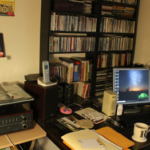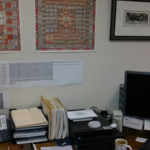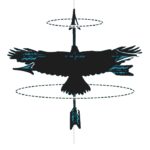You have published a number of pieces with us, including “Dark Lotus, Black Noise” which appeared in our KINTSUGI issue. Can you tell us a little bit about your inspiration for the piece, and how you feel like you’ve grown as a writer since having it published?
“Dark Lotus, Black Noise”: I haven’t looked at this poem since it came out a few years back. So it’s really cool to look at it again with some distance. Fresh eyes and all that. I might do some things differently now. Certainly some different line breaks and stanza construction. Different word choice here and there depending on the day or the mood.
The themes still resonate, though. The inspirations are clear: 1) Solaris by Stanislaw Lem. 2) H.D.’s Trilogy 3) Heraclitus 4) Hakudo maru legend. It’s all about the impossibility of contact and the limits of the human mind. It’s set on some unnamed, unnamable alien planet, but it’s rooted in ‘Earth’. So, it’s also, by extension, a meditation on the problems of speculative literature itself. We can imagine new worlds, but they are still going to be mirrors (intentional or unintentional, imperfect or distorted, mythical or real) into Earth. A truly alien place will be so bewildering and so bizarre that it will completely shake us to our cores, making us realize in turn our own total strangeness. Words would fail.
This piece is also the second part of a longer “cycle” of these themes which I explore more deeply in Lost Gardens of the Hakudo Maru; you can see much of it for free in Google Books here. Strange Horizons reviewed it last year and really nailed a lot of what I wanted to say – and more eloquently, too.
I suspect my work has changed more than this in the last few years, but I’m not sure how. Perhaps I’m more confident. Taking more risks. I’m too close to it to tell, though. Obviously, I’d never write in the same way as I did a few years ago!
What advice would you as a writer now, give you as a writer then?
I started writing in the early 1990s in college. Boy was it was bad! Bloated. Derivative. Ponderous. I got rejected. A lot. I wasn’t ready for that. So, I quit out of frustration. I didn’t write creatively for nearly 20 years. My advice to me then would be four-fold: 1) don’t be so dumb! The worst thing you can ever do is stop. 2) don’t do it for money, fame, or impressing that girl; the ‘thing,’ whatever it is, is to be found in the writing, not the results. 3) finish something and move on. I used to tinker endlessly until the piece lost its bite. Best not to do that. 4) Hey hipster doofus: don’t take it so seriously. It’s supposed to be enjoyable!
What time of day do you do most of your writing? Describe your writing rituals and your creative space.
This is hard to answer. I fit it in during spare moments in the day. I find, though, there’s generally more time in that hour or so right after my daughter falls asleep – sometime between 9:00 and 10:00  PM. That quiet bookend to the day is when the mind comes back to life for some brief focused writing. I could be riding my bike to the office & find thoughts/images/whole poems piling up in my mind. It’s unexpected and so I can’t always just sit down and turn it on at a set time. But when I do sit down to record it, it’s the same: initial image, worked and reworked, stretched out and hammered until satisfied, a malleable lump of gold shaped into something lovely.
PM. That quiet bookend to the day is when the mind comes back to life for some brief focused writing. I could be riding my bike to the office & find thoughts/images/whole poems piling up in my mind. It’s unexpected and so I can’t always just sit down and turn it on at a set time. But when I do sit down to record it, it’s the same: initial image, worked and reworked, stretched out and hammered until satisfied, a malleable lump of gold shaped into something lovely.
 As random as that inspiration part is, I do tend to work in the same spot in the same way: on a computer with MS Word in my work or home office. Music is on. At work: iTunes. At home: vinyl and CD. I look at my collection of records as I work. I like the smell of vinyl. There’s a mandala from Sanjūsangen-dō in Kyoto on my wall in my work office. It reminds me that perfection is temporary and then disappears.
As random as that inspiration part is, I do tend to work in the same spot in the same way: on a computer with MS Word in my work or home office. Music is on. At work: iTunes. At home: vinyl and CD. I look at my collection of records as I work. I like the smell of vinyl. There’s a mandala from Sanjūsangen-dō in Kyoto on my wall in my work office. It reminds me that perfection is temporary and then disappears.
Are there repetitive themes within your writing? Where do you draw inspiration for these themes, and how do you find yourself drawn to them?
Lately I’ve taken James Merrill’s advice on writing poetry to heart:
“You hardly ever need to state your feelings. The point is to feel and keep the eyes open. Then what you feel is expressed, is mimed back at you by the scene.”
So, along those lines all of nature and astronomy and geography is fair game and it comes back to me, always: Water; wells; weather; rivers, oceans, sakura; other trees, stars; moons; suns; the far end of the universe; phantom light of ancient stars; rocks, fire, birds (especially tsuruand crows); birds in flight and in flocks; clouds; rain; thunder; &c. I’m always thinking in English and Japanese, so words and phrases that strike me in both languages. Kanji. Haiku. Buddhism. Shinto. Kami-sama. Music of all stripes. I’m chasing that feeling of ‘coldness’ that Emily Dickinson describes when reading a poem. Whatever else comes out of meditation.
Our goal is to publish absurdly unclassifiable literature. Do you have a favourite piece of writing that goes against the grain?
There are too many! Here are a few:
Revolution of the word: A New Gathering of American Avant Garde Poetry 1914-1945. Anthology edited by Jerome Rothenberg. I first encountered this in the summer 1990 and have come back to it constantly for the last 28 years. I highly recommend anyone to read through all of it. Look especially for Harry Crosby “Fragment of an etude for a sun-dial”; Kenneth Patchen “The education of the waters”; Marcel Duchamp “The bride stripped bare by her bachelors, even.”
T.S. Eliot’s Four Quartets. Difficult, diffuse, wondrous, protean, astounding.
Finally, a common name in Japan, but not so well known here: 谷川 俊太郎 Tanikawa Shuntarō Prolific. Creative. Eclectic. I’m awed by his output and range.
What pieces and/or projects are you currently working on?
Two long cycles in progress:
1) Kakushima poems – about Japan & nuclear power. The piece is in a really rough way right now. Needs a ton of revising.
2) The Drake Equation – of which the poem “Drum Star (Orion’s Ghost)” (published in Strange Horizons, 2017) is the first of eight parts. I’m about ready to shop this one around to imprints.
I’m a librarian. I’m surrounded by the potential of data and information to become something bigger, better. Something closer to human, like knowledge. I’m a scholar. I’m curious about my field, especially the impact of digital technology on people. I’m a poet. Somehow. I wasn’t born into it. My family likely preferred I be a chemist or an engineer or even a lawyer — but I went in a different direction. The poetry has a mind of its own, it feels like. I can’t quite control it.
